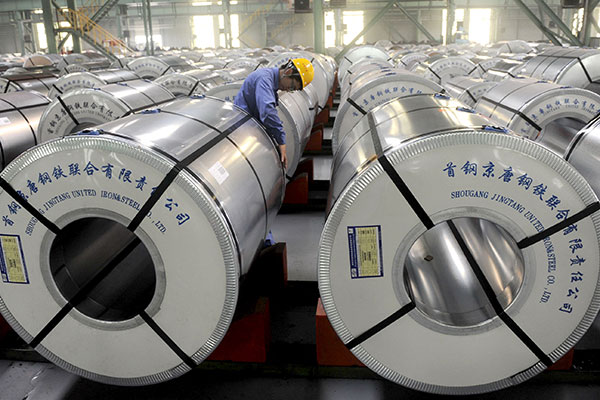
A worker at a workshop of the Shougang Group in Caofeidian, Tangshan, Hebei province.[Photo/Xinhua]
BEIJING-When LanzaTech, a company that turns industrial waste gas into fuel and chemical products, tried to bring its technology to the market, it sought partnerships in the United States.
But it did not happen. In the end, it was in China that the bioenergy startup found some of its first industrial backers.
Baosteel Group and Shougang Group, two major steelmakers, established joint ventures with LanzaTech, laying the foundation for the company’s commercialization.
Since then, global partners joined in, raising more funds for the firm while helping it win global awards in clean energy.
“Without the early involvement of the two Chinese steel giants, it was unlikely the technology would become commercialized,” said Andrew Chung, former general partner at Khosla Ventures, an early investor in LanzaTech.
China’s enthusiasm for clean energy is pushing the global transition toward a low-carbon future. With public and private investment and commitment to collaboration, the country is playing an increasingly important role in global clean tech innovation.
During the past few years, China saw more investment and installation in renewable energy than any other country, according to a report by the World Bank.
Solar and wind capacity have been growing rapidly, as the country tries to shift from coal-based energy consumption to a model more reliant on clean energy.
“The development of clean energy technology in China has been remarkable in the past years,” Adnan Z. Amin, director-general of International Renewable Energy Agency, or IREA, said on the sidelines of a clean energy meeting held in Beijing last week.
“This has also had a global benefit, because this scale of investment in technology, production and manufacturing has led to dramatic decreases in prices,” he added.
China plans to invest 2.5 trillion yuan ($368 billion) into renewable energy projects between 2016 and 2020, creating more than 13 million jobs in the sector, the National Energy Administration revealed.
With the official pledge, the private sector has smelled opportunity.
Electric carmakers in China such as BYD Auto Co Ltd have received a boost in sales, rivaling international competitors including Tesla Inc and Nissan Motor Co Ltd.
Last year, China was by far the largest electric car market, accounting for more than 40 percent of models sold worldwide. That was more than double the amount sold in the US, according to a report by the International Energy Agency.
While betting big on domestic clean tech innovation, China is also actively seeking global expertise in the field while sharing its wisdom with the world.
During a meeting with US Energy Secretary Rick Perry in Beijing, Vice-Premier Zhang Gaoli said he hoped the two countries could strengthen cooperation in the areas of fossil fuels and renewable energy.
California Governor Jerry Brown also expressed his interest in collaborating with Chinese officials and businesses during his visit last week.
He stressed that Chinese expertise in fields including battery technology and zero-emission cars could help California with its own clean energy push.
“The Belt and Road Initiative, proposed by China in 2013, will further boost global clean energy cooperation, creating an interconnected energy system worldwide,” said Amin at the IREA.
“China is important not only from the climate perspective. China is important in the perspective of how energy transition may happen in the future worldwide,” he added.
